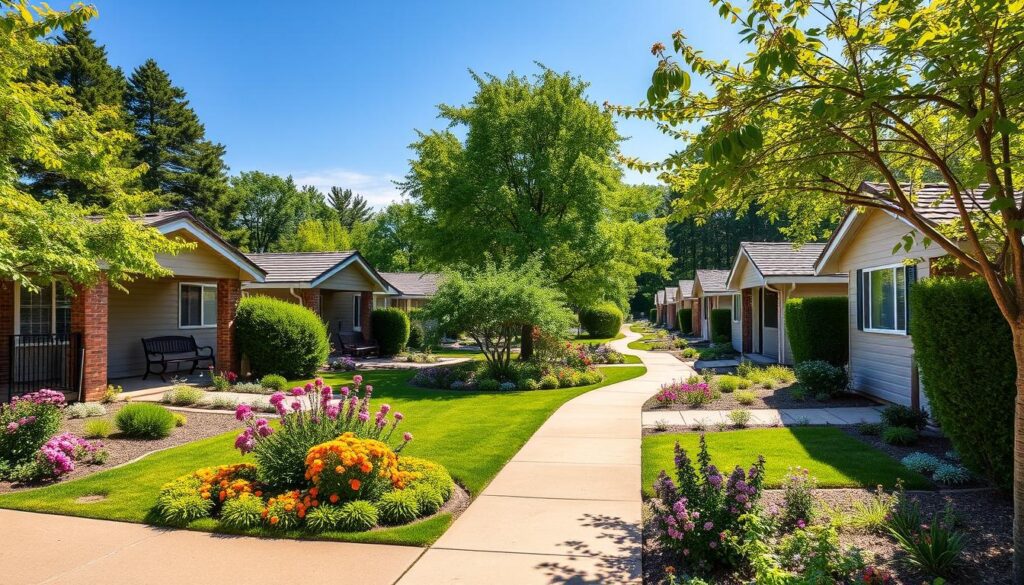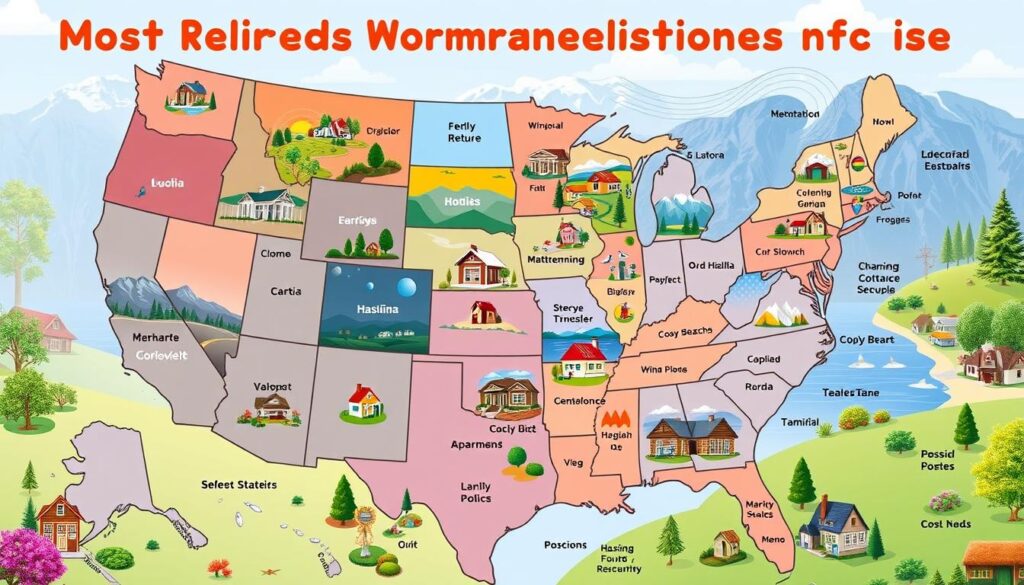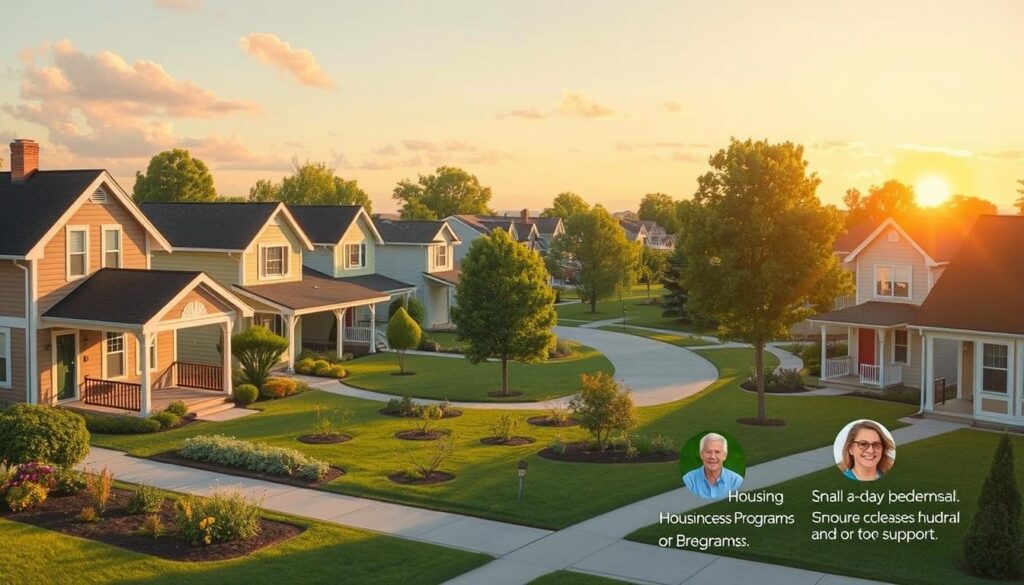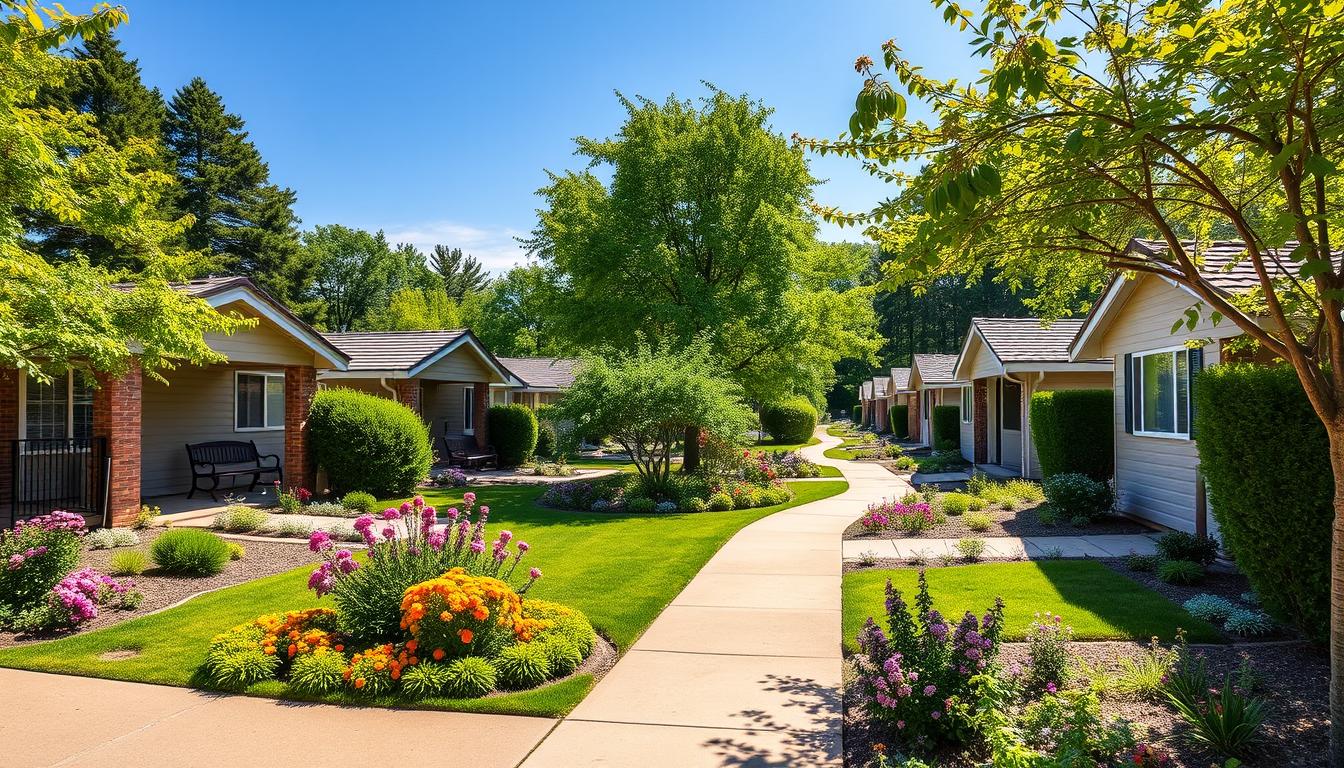How to find affordable housing options for early retirees in the USA ?
How to find affordable housing options for early retirees in the USA ? : As you get ready for early retirement in the USA, finding a place to live is key. You need to think about where you want to live, how much you can spend, and what you like. Affordable housing is a big deal for early retirees, and you’ll need to plan and do your homework.

In the USA, early retirees have special challenges finding a place to live. Your budget, lifestyle, and where you want to live are all important. By understanding the need to plan and research, you can find a home that fits your lifestyle and budget in the USA.
Key Takeaways
- Early retirees in the USA need to plan and research to find affordable housing options.
- Location, budget, and lifestyle are key when looking for affordable housing.
- Affordable housing is out there in the USA, but you need to look carefully.
- Knowing your budget and lifestyle helps you make smart choices about housing.
- Early retirees should focus on their needs and wants when searching for housing.
- Exploring different options can help you find the right affordable housing for you.
Understanding the Early Retirement Housing Challenge
As you get closer to early retirement, you’ll face a big housing challenge. Your home is probably your biggest asset. Deciding what to do with it can be tough. You’ll need to think about affordability, upkeep, and how easy it is to get around in your home.
Early retirement changes how you think about housing. You might need to move to a smaller place or a cheaper area. Financial considerations are key here. You’ll have to plan for costs like mortgage, taxes, and upkeep.
Common Housing Concerns for Early Retirees
- Affordability: Can you afford to keep your current lifestyle in your preferred location?
- Maintenance: Are you ready for the physical and financial work of owning a home?
- Accessibility: Is your home easy to get around in, or will you need to make changes for mobility issues?
Impact of Early Retirement on Housing Choices
Early retirement changes your housing needs a lot. You might think about how close you are to family and friends. You’ll also consider access to healthcare and the cost of living in your area.
Financial Considerations for Housing in Early Retirement
When planning your housing for early retirement, think about your money situation. You’ll need to budget for mortgage, taxes, and upkeep. Downsizing or moving to a cheaper area might help stretch your retirement savings.
By carefully thinking about these points and looking at your options, you can beat the housing challenge. You can find a home that fits your needs and budget. This will help make your early retirement comfortable and secure.
Exploring Different Types of Affordable Housing Options
As an early retiree in the USA, you have many affordable housing options. Think about location, size, and amenities when searching for a new home. Options range from apartments to single-family homes, each with its own advantages and disadvantages.
Affordable housing options are key for early retirees. They impact your quality of life and financial security. In the USA, many early retirees aim to downsize and cut living costs. Popular choices include:
- Apartment living, which offers community and convenience
- Condominiums, blending ownership with shared amenities
- Single-family homes, providing more space and flexibility
When looking at these options, consider what matters most to you. Think about healthcare services, transportation, and social activities nearby. By weighing the pros and cons, you can choose the best fit for your lifestyle and budget.
In the USA, early retirees can find affordable housing in cities and rural areas. Research and compare to find a home that meets your needs and budget. Don’t forget to use online tools and real estate professionals to help you.
| Housing Option | Pros | Cons |
|---|---|---|
| Apartment | Convenient, community-oriented | Less space, possible noise |
| Condominium | Mix of ownership and shared amenities | Feeling of shared ownership, possible rules |
| Single-family Home | More space, flexibility | Higher maintenance, possible isolation |
Benefits of Downsizing for Early Retirees
Thinking about downsizing to a smaller home? It’s a smart move for early retirees. Downsizing can make your life simpler, cut costs, and give you more time for fun. You’ll save on mortgage, taxes, and upkeep.
Downsizing brings big financial advantages. You can use the money from selling your old home to fund your retirement. Plus, your monthly bills will drop, stretching your savings further.
Financial Advantages of Smaller Homes
- Lower mortgage payments
- Reduced property taxes
- Lower maintenance and upkeep costs
Maintenance and Upkeep Considerations
Smaller homes need less care, which is great for retirees. You’ll spend less time cleaning, mowing, and paying for utilities. This means more time for hobbies and relaxation.
Emotional Aspects of Downsizing
Downsizing is not just about money; it’s also emotional. You might have to let go of cherished items or adjust to a new place. Yet, many retirees find it’s worth it for a simpler, happier life.
Retirement Communities and Their Cost Benefits
As an early retiree, you might be looking at different living options. Retirement communities are worth considering. They offer cost benefits that can stretch your retirement savings. These communities are made for seniors, providing a community feel and access to amenities like dining and healthcare.
Some key cost benefits of retirement communities include:
- Lower housing costs: Many offer affordable housing like apartments or cottages, which can save money compared to a big house.
- Access to amenities: Communities provide amenities like dining, fitness centers, and activities. This can cut down on the need for separate memberships.
- Healthcare services: Some communities have on-site healthcare services. This can lower healthcare costs and give peace of mind.
For early retirees, retirement communities are appealing. They offer community support and cost benefits that make retirement more affordable. By looking at different types of communities, you can find one that fits your needs and budget.
When looking at retirement communities, consider the pros and cons. Think about cost, amenities, and care levels. Researching and exploring your options can help you make a choice that suits your needs and ensures a happy retirement.
| Retirement Community Type | Cost | Amenities |
|---|---|---|
| Age-Restricted Community | Varies | Dining, fitness center, recreational activities |
| Continuing Care Retirement Community | Higher upfront costs | On-site healthcare services, rehabilitation center |
| Assisted Living Facility | Higher monthly costs | 24/7 care and support, medication management |
How to Find Affordable Housing Options for Early Retirees in the USA
Finding affordable housing as an early retiree can be tough. But, with the right tools and advice, it’s easier. Start by checking out online resources like housing websites and apps. They show you what’s available and how much it costs.
Also, working with real estate experts can help a lot. They know the local market well. They can find homes that match your budget and needs.
Online Resources and Tools
- Housing websites and apps, such as Zillow and Redfin, provide a wide range of listings and pricing information.
- Online forums and communities, such as Reddit’s r/retirement, offer valuable advice and insights from experienced retirees.
Working with Real Estate Professionals
Real estate professionals offer great help in finding affordable homes. They guide you through the local market. They also help with price negotiations and the buying process.
Government Programs and Assistance
The government has programs to help early retirees find affordable housing. These include housing subsidies, tax credits, and more. Visit the US Department of Housing and Urban Development (HUD) website to learn about these programs and how to apply.
Most Affordable States for Early Retirees
Thinking about early retirement? You’re probably looking for affordable places to live. The cost of living and tax laws are key. You want your retirement savings to last, so you can enjoy your years without worry.
Some states are great for early retirees because they’re cheap and tax-friendly. Oklahoma, Arkansas, and Tennessee have low living costs. Florida, Texas, and South Carolina are good for keeping more of your retirement money because of their taxes.

- Cost of living: Look for states with low housing costs, affordable healthcare, and reasonable living expenses.
- Tax-friendly states: Consider states with low or no state income tax, as well as those that exempt retirement income from taxation.
- Healthcare accessibility: Ensure that the state you choose has quality healthcare facilities and accessible medical services.
By looking at these factors, you can find a state that’s affordable and meets your needs. This way, you can enjoy a comfortable retirement.
| State | Cost of Living Index | State Income Tax |
|---|---|---|
| Oklahoma | 88.3 | 0.87% |
| Arkansas | 86.3 | 7.0% |
| Tennessee | 89.1 | 1.0% |
Alternative Housing Solutions to Consider
If you’re an early retiree in the USA, you might be searching for new housing options. House sharing is a cost-effective choice that lets you live in a great area. Co-housing also offers community and shared duties. Alternative housing like these can make your retirement fulfilling.
Another choice is tiny homes, which are becoming more popular. They’re often cheaper than regular houses and perfect for downsizing. You can find tiny homes in cities and countryside across the USA. When looking at alternative housing, think about cost, community, and lifestyle.
- Lower costs: Alternative housing options can be more affordable than traditional housing.
- Community: Many alternative housing options offer a sense of community and shared responsibilities.
- Lifestyle: Alternative housing solutions can provide a unique and fulfilling experience for early retirees.
When exploring alternative housing, do your homework. Look for resources online to guide your choice. By looking into alternative housing, you can find a perfect fit for your retirement in the USA.
Financial Strategies for Securing Affordable Housing
As you get closer to retirement, think about how to afford housing. Look into different mortgage options like reverse mortgages or adjustable-rate mortgages. Also, check your retirement savings to make sure you have enough for housing costs.
When looking at mortgages, consider interest rates, repayment terms, and fees. It’s important to know how much you can spend on housing. You might want to talk to a financial advisor for a personalized plan. Some things to keep in mind are:
- Assessing your budget to determine how much you can afford to spend on housing
- Exploring different mortgage options, such as fixed-rate or adjustable-rate mortgages
- Reviewing your retirement savings to ensure you have a sufficient nest egg
Creating a solid financial plan helps secure affordable housing in retirement. Always check and update your plan as your finances or housing needs change.
Making the Most of Housing Assistance Programs
If you’re an early retiree in the USA, you might qualify for housing assistance programs. These programs offer financial help, subsidies, or support to make your home affordable. They help you reach your housing goals.
Some housing assistance programs for early retirees in the USA include:
- Government subsidies for housing costs
- Non-profit organizations that provide financial assistance for housing
- Private companies that offer housing assistance programs for retirees
To get the most from these programs, learn about their eligibility, application, and benefits. Start by visiting government, non-profit, or private company websites that offer housing help for early retirees in the USA.

Using these programs can make your retirement more affordable and secure. You’ll have a comfortable home. Always check the program terms and seek advice if needed.
| Program | Eligibility | Benefits |
|---|---|---|
| Government Subsidies | Low-income early retirees | Financial assistance for housing costs |
| Non-Profit Organizations | Early retirees in need of financial assistance | Financial assistance for housing costs, counseling, and support |
| Private Companies | Early retirees who meet specific criteria | Housing assistance programs, financial assistance, and other benefits |
Tips for Negotiating Housing Costs
As an early retiree in the USA, it’s key to negotiate housing costs well. This ensures a comfortable and affordable home. Start by researching the local market and understanding housing price trends.
When negotiating, working with sellers and agents is important. A real estate agent familiar with early retirees can help a lot. They know the local market well. You might also get better deals by talking directly to sellers.
Understanding Market Conditions
Knowing the market is vital for negotiating housing costs. Look into the local real estate market. Find out what similar homes are selling for. This info can help you negotiate a fair price.
Some key factors to consider include:
- Location: The location greatly affects a property’s price. Homes in popular areas cost more.
- Condition: The property’s condition also matters. Homes needing repairs or updates might be cheaper.
- Amenities: Features like a pool or gym can raise a property’s price.
By understanding these factors and the local market, you can negotiate better. This way, you can find a comfortable and affordable home as an early retiree in the USA.
Red Flags to Watch For When House Hunting
As an early retiree, finding the right home is key to starting this new chapter. When house hunting, it’s vital to spot red flags that could affect your choice.
Location, condition, and cost are important. For instance, a home in a flood zone or with pest issues might not be ideal. Early retirees often seek a peaceful living environment.
Here are more red flags to watch for in house hunting:
- High crime rates in the area
- Outdated or faulty electrical and plumbing systems
- Environmental hazards such as lead paint or asbestos
- Restrictive homeowners association rules
Knowing these red flags helps you make a better choice. Do your homework, work with a trusted agent, and trust your instincts. If something doesn’t feel right, it’s okay to walk away.
Conclusion: Securing Your Retirement Home Without Breaking the Bank
Planning for early retirement means finding affordable housing. This is key to keeping your finances stable and enjoying your golden years. Look into different affordable housing options for early retirees. You’ll find a home that fits your budget and lifestyle.
Success comes from doing your homework, planning smart, and being open to new living ideas. With effort and determination, you can find a great retirement home. You won’t have to sacrifice your financial health.
Downsizing, checking out retirement communities, or using government help can work. The right strategy can make your housing dreams come true. Stay alert, get advice from experts, and keep looking for new options. Your perfect retirement home is just around the corner.
FAQ
What are some common housing concerns for early retirees?
Early retirees worry about affordability, maintenance, and accessibility. These concerns are key when choosing a home. Financial considerations play a big role too.
What are the benefits of downsizing for early retirees?
Downsizing can save money and reduce upkeep. It also brings emotional benefits. But, it’s important to think about how it might change your lifestyle and relationships.
What are some online resources and tools for finding affordable housing options?
Online, there are many tools to find affordable homes. Websites and apps can help. Working with real estate pros and looking into government programs are also good ideas.
What are some alternative housing solutions to consider?
Early retirees might look into house sharing, co-housing, or tiny homes. These options can be cost-effective and lifestyle-friendly.
What financial strategies can help secure affordable housing?
To find affordable housing, early retirees can explore mortgage options. Using retirement savings wisely is also key. Insurance and protection plans are important too.
What are some red flags to watch for when house hunting?
When looking for a house, watch out for location, condition, and cost issues. These can affect safety, convenience, and resale value.
